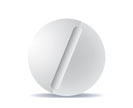 June 9, 2011 – The US Food and Drug Administration has just alerted healthcare professionals about changes in the labeling of 5-alpha reductase inhibiting drugs (5-ARI). These drugs for Benign Prostate Hypertrophy (BPH), include finasteride (Proscar) and dutasteride (Avodart).
June 9, 2011 – The US Food and Drug Administration has just alerted healthcare professionals about changes in the labeling of 5-alpha reductase inhibiting drugs (5-ARI). These drugs for Benign Prostate Hypertrophy (BPH), include finasteride (Proscar) and dutasteride (Avodart).
The drug labels must now warn that there is an increased risk of being diagnosed with a high-grade prostate cancer while taking these drugs.
Both drugs are marketed for use in BPH and were being investigated for — but not approved for — prostate cancer prevention in men at high risk.
However, during the these studies looking at prostate cancer prevention, investigators discovered that there was evidence of a significant increased incidence of high-grade prostate cancer in the men that were taking the 5-alpha reductase inhibiting drugs.
The FDA said that the risk appears to be low but says that practitioners need to be aware of this safety information. The known benefits can then be more accurately weighed against the potential risks when doctors make a decision about starting or continuing treatment with these drugs.
The decision to issue this new safety data is based on the FDA’s review of the Prostate Cancer Prevention Trial (PCPT) and the Reduction by Dutasteride of Prostate Cancer Events (REDUCE) trial. While the trials demonstrated an overall reduction in prostate cancer diagnoses, there was an increase in the incidence of high-grade prostate cancer in both trials, and some experts have questioned use of these agents in these settings.
Data from the PCPT and REDUCE trials were discussed at the FDA’s Oncologic Drugs Advisory Committee, held on December 1, 2010, which recommended against approval of a prevention indication for these drugs.
Do the Risks Outweigh the Benefits?
The PCPT evaluated the daily use of finasteride, 5 mg, vs placebo for 7 years, and showed a reduction in the cumulative incidence of all types of prostate cancer, from 24.4% in the placebo group to 18.4% in the finasteride group, during the study period.
The rates of prostate cancer during the 7-year period in the finasteride (Proscar) group, showed an absolute risk reduction of 1.4%.
This overall risk reduction was limited to a decrease in prostate cancers with a GS of 6 or lower. In contrast, there was an increased incidence of cancers with a GS of 8 to 10 with dutasteride vs placebo (1% vs 0.5%, respectively).
However, a review of these findings published in 2009 in Clinical Cancer Research suggested that finasteride did not cause high-grade prostate cancers but simply made them easier to diagnose (Clin Cancer Res. 2009;15:4694-4699).
What are the possible side effects of finasteride (Proscar)?
Most serious side effects include:
- male breast cancer, breast lumps, pain, nipple discharge, or other breast changes.
- allergic reaction: hives; difficulty breathing; swelling of your face, lips, tongue, or throat.
Less serious side effects may include :
- feeling like you might pass out;
- swelling in your hands or feet;
- pain in the testicles;
- impotence, loss of interest in sex, or trouble having an orgasm;
- abnormal ejaculation;
- swelling or tenderness in your breasts;
- dizziness, weakness;
- headache;
More information is available at the FDA Web site.
Dr. Hansen’s Rx for Prostate health

